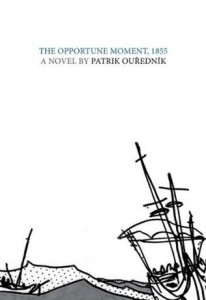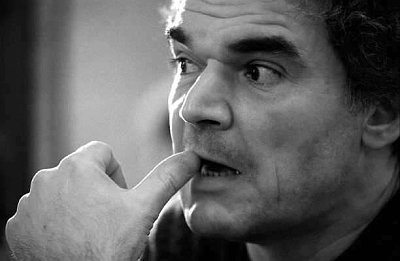Fuse Book Review: A Post-Modern History Lesson
At the very least, showing the triumph of reality over mad illusions of perfection doesn’t lead to particularly complex drama in a novel of ideas; it is sort of like picking off myopic dreamers in a barrel.
The Opportune Moment, 1855 by Patrik Ouředník. Translated from the Czech by Alex Zucker. Dalkey Archive Press, 136 pages, $12.95.
By Bill Marx.
Over the past 20 years or so, the global fictional case against the Utopian impulse has become a slam-dunk, novelists from Latin America to Eastern Europe embracing the reality principle with born-again gusto, often ladling out shocks of disillusionment to what they see as the babyish, anti-capitalist, pro-collectivist sensibility of the left-wing ideologues among us. Patrik Ouředník’s The Opportune Moment, 1855 is unorthodox in terms of its structure but uses its formal hi-jinks to score conservative points: Collective progress is an illusion; Democratic-socialist ideals resist pragmatic implementation.
Expectations of the literary imagination were not always so resolutely sedate: in his book Politics and the Novel, American critic Irving Howe wrote of the “vast respect which the great novelist is ready to offer the whole idea of opposition.” There was a time that demand meant a modest expectation that the novelist would embrace (or at least entertain) a belief that political, social, and cultural conditions might be improved, and that part of what a writer was supposed to do was to remind people that what they had was not good enough. Does the impulse to envisage the Utopian always manifest what one admiring French critic of The Opportune Moment, 1855 calls “ideological idiocy”? Isn’t there something in the exercise of the imagination that suggests discontent with the way things are?
At the very least, showing the triumph of reality over inane illusions of perfection doesn’t lead to a particularly complex drama in a novel of ideas; it is sort of like picking off myopic dreamers in a barrel. That’s the impression left by The Opportune Moment, 1855; if a tale of nineteenth-century anarchists receiving their satiric comeuppance rings your aesthetic/political chimes than this will be an enjoyable read.
I had eagerly anticipated this book because I appreciated the scruffy charm of Ouředník’s previous novel in translation Case Closed, an amusing send-up of detective yarns that also reflected a sense of political impotence, serving up a zany, cultural critique of contemporary Czech society, a lackadaisical society whose endemic incompetence and comfortable corruption is unfazed by decades of political changes, authoritarianism comfortably giving way to capitalist delusion.
But that book featured a gathering of superannuated scalawags, led by a prickly retiree named Viktor Dyk, who attempt to dredge some satisfactions—residual respect, sadistic thrills—out of the mess of existence. They are funky anti-heroes. In The Opportune Moment, 1855 Ouředník burlesques the pathetic efforts of a motley band of erstwhile “brothers” who won’t accept the bottom line of social convention, delineating the sad devolution of their delusions. The appeal of the paradisaical (Marxist or otherwise) is never lent any value.
The first part of the book is a long letter written at the end of the nineteenth century by an unusually wild-eyed anarchist to his former mistress. His dream is of a perfect political order—beyond Communism, beyond Capitalism—with a particular animus against marriage: “If I could rid mankind of a single plague (locusts, religion, cholera, pestilence, private property, wars, government, parliaments, or national revivalists), I would choose marriage—font of unfreedom, hypocrisy, and stupidity.”
The rejection of all things established (dismissed as Evil in a kind of weak-kneed Dostoevskian rant) culminates in a vision of telepathic community: “In the depths of the night sometimes I plunge into a mad dream: that one day people will do without words and speak with one another using nothing but the gaze of their eyes in infinite love and kindness, in the mutual understanding of free beings.” Is there any surprise that this surreal vision of brotherhood, in which “reorganization is replaced by disorganization,” will come to no good?
The rest of the book is set in 1855 and explores what happens when the Utopian impulse, inspired by the convictions of the anti-marriage activist, is acted on. Told via the diary entries of an Italian sailing from France with a multicultural group of 200 determined to set up a commune in Brazil, the events follow a predictable downward course, the hardship of the journey, coupled with ethnic differences, selfishness, sexual jealousy, and personal disagreements, undercutting initial egalitarian hopes, a break-down that continues, moving into violence and ugly defeat, once the group fragments in Brazil. The narrative doesn’t create individual characters so much as lay out a deadpan chronicle of disagreements high and low, one woman “didn’t trust vegetarians, because anyone who didn’t eat meat must be out of their minds. Just one piece of freshly grilled meat and it’s like your stomach is in heaven.” A full tummy is about as close as our settlers get to their idealistic goals.
Our Italian, though determined to be loyal to his ideals, finally admits defeat, questioning whether the constraints of society and liberty can co-exist: “is civilization necessarily a vehicle for freedom, and one might have doubts about that.” To me this is where the novel should begin rather than end; the hard imaginative work would be to calibrate where the balance between order and freedom lies once sociopathic fantasy falls short. As it is, Ouředník’s point of no return doesn’t pack Swiftian or Vortairean punch but reeks of cynical dismissal.
What’s more, by focusing on a cartoon version of Utopian yearning, Ouředník raises questions about what he has chosen to call an Opportune Moment, a term that suggests the ancient Greek word kairos, a break in chronological time, a transitional period in which miracles happen. How does the end of this foregone disaster in communal living signify the end of the reasonable yearning for political justice and freedom? Doesn’t literature still have the burden of rejecting the ways things are, of offering a cultural critique?


